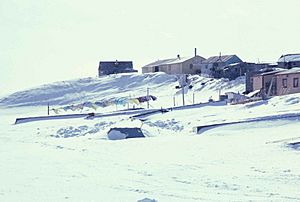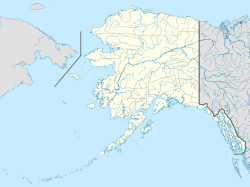Mekoryuk, Alaska facts for kids
Quick facts for kids
Mekoryuk
Mikuryarmiut / Mikuryar
|
|
|---|---|

Mekoryuk in 1978
|
|
| Country | United States |
| State | Alaska |
| Census Area | Bethel |
| Incorporated | September 24, 1969 |
| Area | |
| • Total | 7.08 sq mi (18.34 km2) |
| • Land | 7.07 sq mi (18.30 km2) |
| • Water | 0.01 sq mi (0.03 km2) |
| Elevation | 7 ft (2 m) |
| Population
(2020)
|
|
| • Total | 206 |
| • Density | 29.15/sq mi (11.25/km2) |
| Time zone | UTC-9 (Alaska (AKST)) |
| • Summer (DST) | UTC-8 (AKDT) |
| ZIP code |
99630
|
| Area code | 907 |
| FIPS code | 02-47990 |
| GNIS feature ID | 1406211 |
Mekoryuk is a small city located on Nunivak Island in Alaska, United States. The city's name comes from the Nunivak Cup'ig word Mikuryarmiut or the Central Yup'ik word Mikuryar. It is the only permanent community on Nunivak Island. In 2020, about 206 people lived there.
Contents
History of Mekoryuk
Early Life on Nunivak Island
Nunivak Island has been home to the Nuniwarmiut for about 2,000 years. These are the native people of the island.
The first time Europeans visited the island was in 1821. Explorers from the Russian-American Company arrived. They wrote that about 400 people lived in 16 different villages on Nunivak Island.
Changes and Challenges
In 1880, a census taker named Ivan Petrof counted 702 Yup'ik people living in 9 villages. One of these villages, "Koot," was near where Mekoryuk is today and had 117 people. Sadly, a serious illness in 1900 left only four families alive in that village.
In the 1930s, a church and a school were built in Mekoryuk. People from other parts of the island started moving to Mekoryuk to be closer to the school.
Animals and New Ways
Reindeer herding was brought to the island in 1920 by a trader. The United States government bought the reindeer operation in the 1940s. A building for processing reindeer meat was built in 1945. These reindeer were later bred with caribou from Denali Park to make them larger.
In 1934, 34 musk ox were brought to Nunivak Island from Greenland. This was done to help save the species from disappearing. Today, there are about 500 musk ox on the island. Some of their calves have been moved to other parts of Alaska.
Modern Times
By the middle of the 20th century, Mekoryuk became the only place on the island where people lived all year round. Before the 1940s, people on the island followed their traditional ways of life and ceremonies.
The 1950s and 1960s brought many changes. The Mekoryuk Airport was built in 1957. Men from Mekoryuk also went to Fort Richardson for training when the Alaska Territorial Guard was formed.
During the winter, many families would move to Bethel so their children could attend high school. They would return in the spring for fishing and hunting sea animals. A high school was finally built in Mekoryuk in 1978, so families no longer had to leave.
Geography
Location of Mekoryuk
Mekoryuk is located on the north side of Nunivak Island. This island is in the Bering Sea, about 48 kilometers (30 miles) west of the Alaska coast. The city is at the mouth of Shoal Bay.
The city covers an area of about 18.34 square kilometers (7.08 square miles). Most of this area is land, with only a very small part being water.
Climate
Mekoryuk has a tundra climate. This means it has very cold winters and cool summers. It is also close to a subarctic climate, which means it can get very cold.
| Climate data for Mekoryuk, Alaska | |||||||||||||
|---|---|---|---|---|---|---|---|---|---|---|---|---|---|
| Month | Jan | Feb | Mar | Apr | May | Jun | Jul | Aug | Sep | Oct | Nov | Dec | Year |
| Record high °F (°C) | 41 (5) |
38 (3) |
48 (9) |
48 (9) |
70 (21) |
71 (22) |
77 (25) |
70 (21) |
63 (17) |
54 (12) |
46 (8) |
47 (8) |
77 (25) |
| Mean daily maximum °F (°C) | 19.2 (−7.1) |
16.8 (−8.4) |
21.1 (−6.1) |
28.4 (−2.0) |
38.6 (3.7) |
47.8 (8.8) |
53.7 (12.1) |
54.5 (12.5) |
50.0 (10.0) |
39.0 (3.9) |
30.4 (−0.9) |
20.0 (−6.7) |
35.0 (1.7) |
| Daily mean °F (°C) | 12.1 (−11.1) |
9.7 (−12.4) |
13.6 (−10.2) |
22.4 (−5.3) |
34.0 (1.1) |
42.5 (5.8) |
48.4 (9.1) |
49.6 (9.8) |
45.3 (7.4) |
34.5 (1.4) |
25.4 (−3.7) |
13.6 (−10.2) |
29.3 (−1.5) |
| Mean daily minimum °F (°C) | 5.0 (−15.0) |
2.5 (−16.4) |
6.0 (−14.4) |
16.4 (−8.7) |
29.3 (−1.5) |
37.1 (2.8) |
43.1 (6.2) |
44.7 (7.1) |
40.6 (4.8) |
30.0 (−1.1) |
20.3 (−6.5) |
7.2 (−13.8) |
23.5 (−4.7) |
| Record low °F (°C) | −35 (−37) |
−30 (−34) |
−30 (−34) |
−12 (−24) |
0 (−18) |
27 (−3) |
28 (−2) |
23 (−5) |
15 (−9) |
9 (−13) |
−18 (−28) |
−39 (−39) |
−39 (−39) |
| Average precipitation inches (mm) | 0.86 (22) |
0.83 (21) |
1.11 (28) |
0.87 (22) |
0.55 (14) |
0.81 (21) |
1.44 (37) |
2.12 (54) |
2.23 (57) |
1.72 (44) |
1.31 (33) |
1.14 (29) |
14.99 (382) |
| Average snowfall inches (cm) | — | 2.9 (7.4) |
6.8 (17) |
2.6 (6.6) |
3.1 (7.9) |
1.7 (4.3) |
0.0 (0.0) |
0.0 (0.0) |
0.7 (1.8) |
7.4 (19) |
10.7 (27) |
10.0 (25) |
46.0 (117) |
| Source: WRCC | |||||||||||||
People of Mekoryuk
Population Changes Over Time
Mekoryuk first appeared in the U.S. Census in 1950. The population has changed over the years. In 2000, there were 210 people, and in 2010, there were 191. By 2020, the population grew slightly to 206 people.
| Historical population | |||
|---|---|---|---|
| Census | Pop. | %± | |
| 1950 | 156 | — | |
| 1960 | 242 | 55.1% | |
| 1970 | 249 | 2.9% | |
| 1980 | 160 | −35.7% | |
| 1990 | 177 | 10.6% | |
| 2000 | 210 | 18.6% | |
| 2010 | 191 | −9.0% | |
| 2020 | 206 | 7.9% | |
| U.S. Decennial Census | |||
Who Lives in Mekoryuk?
Most people living in Mekoryuk are Native American. In 2000, about 90% of the people were Native American. The average household had almost 3 people, and families were a bit larger.
The population includes people of all ages. In 2000, about 32% of the people were under 18 years old. The average age was 36 years.
Education
The Lower Kuskokwim School District runs the Nuniwarmiut School in Mekoryuk. This school teaches students from kindergarten all the way through 12th grade. The school building was built in 1984.
See also
 In Spanish: Mekoryuk para niños
In Spanish: Mekoryuk para niños


